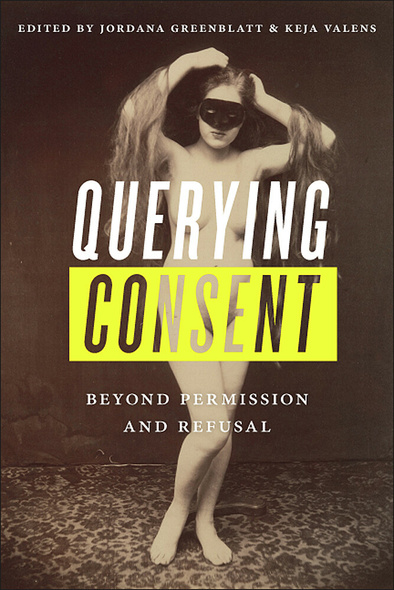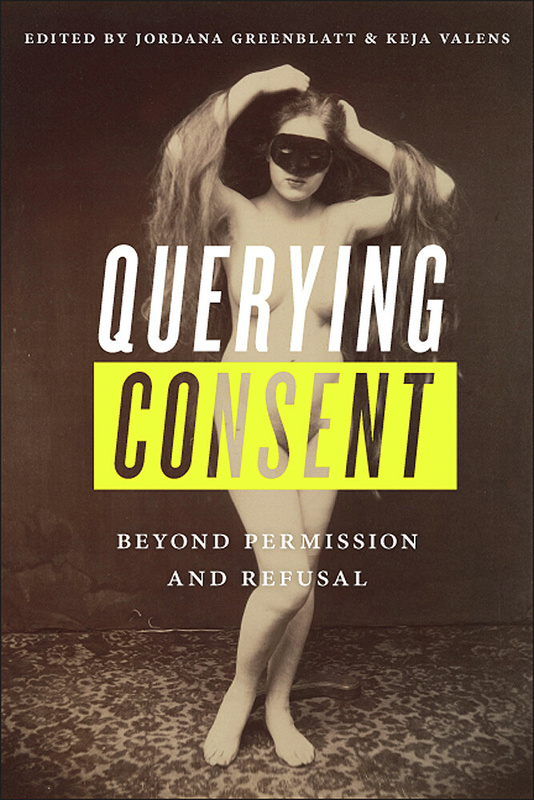Our shopping cart is currently down. To place an order, please contact our distributor, UTP Distribution, directly at utpbooks@utpress.utoronto.ca.

270 pages, 6 x 9
Paperback
Release Date:06 Jul 2018
ISBN:9780813594132
Hardcover
Release Date:06 Jul 2018
ISBN:9780813594149
Querying Consent
Beyond Permission and Refusal
Rutgers University Press
Querying Consent examines the ways in which the concept of consent is used to map and regulate sexual desire, gender relationships, global positions, technological interfaces, relationships of production and consumption, and literary and artistic interactions. From philosophy to literature, psychoanalysis to the art world, the contributors to Querying Consent address the most uncomfortable questions about consent today. Grounded in theoretical explorations of the entanglement of consent and subjectivity across a range of textual, visual, multi- and digital media, Querying Consent considers the relationships between consent and agency before moving on to trace the concept’s outcomes through a range of investigations of the mutual implication of personhood and self-ownership.
‘Querying Consent gathers contributions that represent a diversity of perspectives on the multi-faceted issue of consent. The collection combines updated discussions on classical controversies with cutting edge and thought-provoking new questions altogether to a timely, much needed intervention and interrogation into the field of study on consent. An intriguing anthology that challenges the reader to think further and into new directions.’
‘Querying Consent gathers contributions that represent a diversity of perspectives on the multi-faceted issue of consent. The collection combines updated discussions on classical controversies with cutting edge and thought-provoking new questions altogether to a timely, much needed intervention and interrogation into the field of study on consent. An intriguing anthology that challenges the reader to think further and into new directions.’
A welcome interdisciplinary dialogue on the limits, exclusions, and paradoxes of consent, this volume poses delightfully challenging questions in a range of idioms and contexts. What does consenting to consent as an elementary relational paradigm prevent us from doing, seeing, knowing? Querying Consent could not be more timely.
A welcome interdisciplinary dialogue on the limits, exclusions, and paradoxes of consent, this volume poses delightfully challenging questions in a range of idioms and contexts. What does consenting to consent as an elementary relational paradigm prevent us from doing, seeing, knowing? Querying Consent could not be more timely.
The essays collected in Querying Consent variously call attention to situations in which what might seem to be consent could in fact be construed to as something closer to coercion--not just in sexual interactions, but in everything from software user agreements to the fine print in authorization forms for medical treatment.
‘Querying Consent gathers contributions that represent a diversity of perspectives on the multi-faceted issue of consent. The collection combines updated discussions on classical controversies with cutting edge and thought-provoking new questions altogether to a timely, much needed intervention and interrogation into the field of study on consent. An intriguing anthology that challenges the reader to think further and into new directions.’
‘Querying Consent gathers contributions that represent a diversity of perspectives on the multi-faceted issue of consent. The collection combines updated discussions on classical controversies with cutting edge and thought-provoking new questions altogether to a timely, much needed intervention and interrogation into the field of study on consent. An intriguing anthology that challenges the reader to think further and into new directions.’
A welcome interdisciplinary dialogue on the limits, exclusions, and paradoxes of consent, this volume poses delightfully challenging questions in a range of idioms and contexts. What does consenting to consent as an elementary relational paradigm prevent us from doing, seeing, knowing? Querying Consent could not be more timely.
A welcome interdisciplinary dialogue on the limits, exclusions, and paradoxes of consent, this volume poses delightfully challenging questions in a range of idioms and contexts. What does consenting to consent as an elementary relational paradigm prevent us from doing, seeing, knowing? Querying Consent could not be more timely.
The essays collected in Querying Consent variously call attention to situations in which what might seem to be consent could in fact be construed to as something closer to coercion--not just in sexual interactions, but in everything from software user agreements to the fine print in authorization forms for medical treatment.
JORDANA GREENBLATT teaches English at York University and writing at the University of Toronto in Canada.
KEJA VALENS is a professor of English at Salem State University in Massachusetts. She is the author of Desire between Women in Caribbean Literature.
KEJA VALENS is a professor of English at Salem State University in Massachusetts. She is the author of Desire between Women in Caribbean Literature.
Contents
Introduction: The Subject of Consent
Jordana Greenblatt and Keja Valens
Part 1: Consent, Power, and Agency
Chapter 1: Consent, Command, Confession
Karmen MacKendrick
Chapter 2: The Gender of Consent in Patmore, Hopkins, and Marie Lataste
Amanda Paxton
Chapter 3: Consensual Sex, Consensual Text: Law, Literature, and the Production of the Consenting Subject
Jordana Greenblatt
Chapter 4: Consent and the Limits of Abuse in Their Eyes Were Watching God and “Ain’t Nobody’s Business if I Do”
Keja Valens
Part 2: Consent, Violence, and Refusal
Chapter 5: The Seduction of Rape as Allegory in Postcolonial Literature
Justine Leach
Chapter 6: Willful Creatures: Consent, Response, and Animal Will in Thomas Hardy’s Tess of
the d’Urbervilles
Kimberly O’Donnell
Chapter 7: Consenting to Read: Trigger Warnings and Textual Violence
Brian Martin
Chapter 8:Blue is the Warmest Color, Luce Irigaray, and the Question of Consent
Caroline Godart
Part 3: Consent, Personhood, and Property
Chapter 9: The Art of Consent
Drew Danielle Belsky
Chapter 10: Sardanapalus’s Hoard: Queer Possession in Henry James's Aspern Papers
Annie Pfeifer
Chapter 11: Queering and Quartering Informed Consent: Genomic Medicine and Hyperreal Subjectivity
Graham Potts
Chapter 12: Vulnerabilities: Consent with Pfizer, Marx, and Hobbes
Matthias Rudolf
Chapter 13: “I Never Heard Anything So Monstrous!”: Developmental Psychology, Narrative Form, and the Age of Consent in What Maisie Knew
Victoria Olwell
Notes on Contributors
Index
Introduction: The Subject of Consent
Jordana Greenblatt and Keja Valens
Part 1: Consent, Power, and Agency
Chapter 1: Consent, Command, Confession
Karmen MacKendrick
Chapter 2: The Gender of Consent in Patmore, Hopkins, and Marie Lataste
Amanda Paxton
Chapter 3: Consensual Sex, Consensual Text: Law, Literature, and the Production of the Consenting Subject
Jordana Greenblatt
Chapter 4: Consent and the Limits of Abuse in Their Eyes Were Watching God and “Ain’t Nobody’s Business if I Do”
Keja Valens
Part 2: Consent, Violence, and Refusal
Chapter 5: The Seduction of Rape as Allegory in Postcolonial Literature
Justine Leach
Chapter 6: Willful Creatures: Consent, Response, and Animal Will in Thomas Hardy’s Tess of
the d’Urbervilles
Kimberly O’Donnell
Chapter 7: Consenting to Read: Trigger Warnings and Textual Violence
Brian Martin
Chapter 8:Blue is the Warmest Color, Luce Irigaray, and the Question of Consent
Caroline Godart
Part 3: Consent, Personhood, and Property
Chapter 9: The Art of Consent
Drew Danielle Belsky
Chapter 10: Sardanapalus’s Hoard: Queer Possession in Henry James's Aspern Papers
Annie Pfeifer
Chapter 11: Queering and Quartering Informed Consent: Genomic Medicine and Hyperreal Subjectivity
Graham Potts
Chapter 12: Vulnerabilities: Consent with Pfizer, Marx, and Hobbes
Matthias Rudolf
Chapter 13: “I Never Heard Anything So Monstrous!”: Developmental Psychology, Narrative Form, and the Age of Consent in What Maisie Knew
Victoria Olwell
Notes on Contributors
Index





